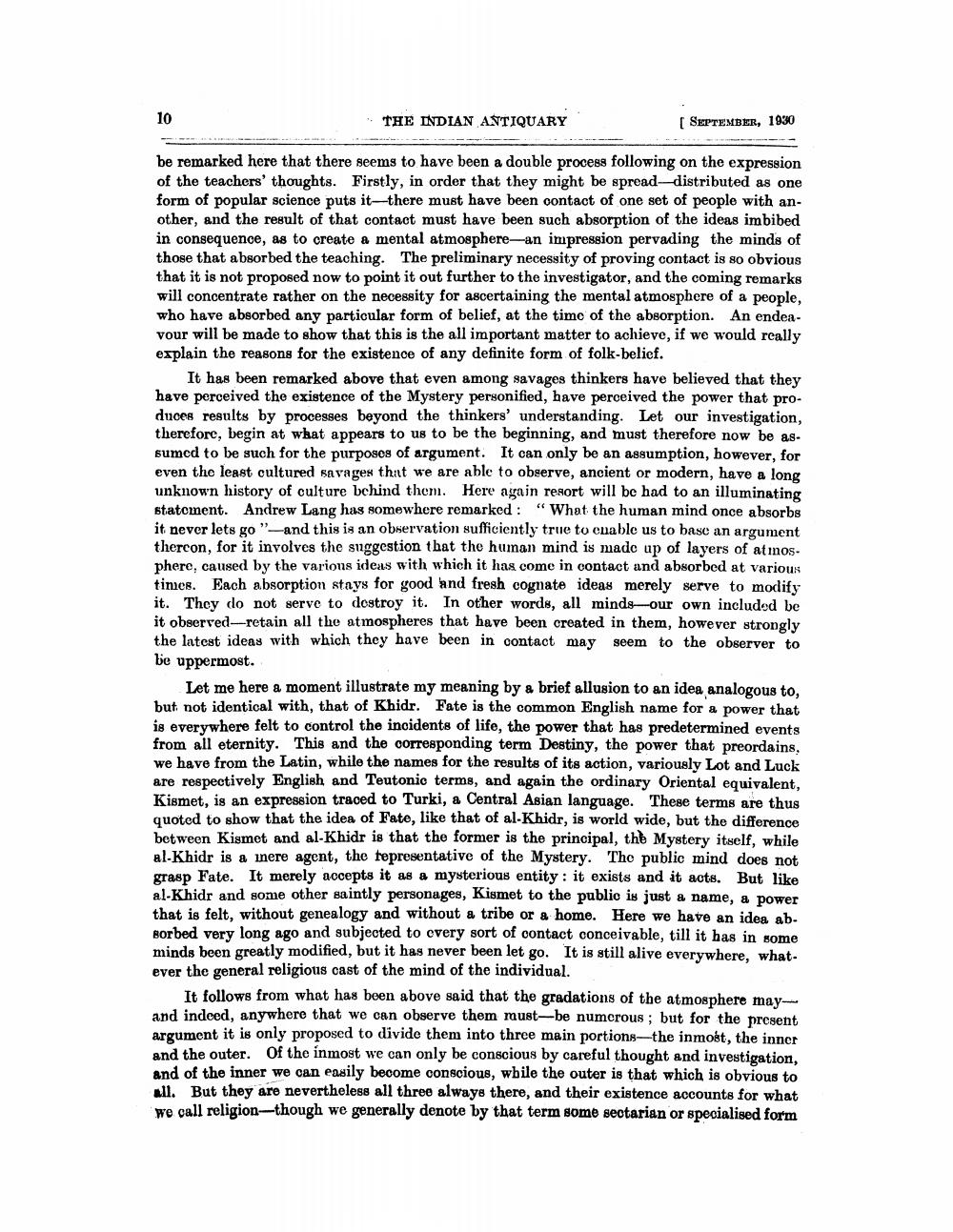________________
THE INDIAN ANTIQUARY
[ SEPTEMBER, 1930
be remarked here that there seems to have been a double process following on the expression of the teachers' thoughts. Firstly, in order that they might be spread distributed as one form of popular science puts it-there must have been contact of one set of people with another, and the result of that contact must have been such absorption of the ideas imbibed in consequence, as to create a mental atmosphere an impression pervading the minds of those that absorbed the teaching. The preliminary necessity of proving contact is so obvious that it is not proposed now to point it out further to the investigator, and the coming remarks will concentrate rather on the necessity for ascertaining the mental atmosphere of a people, who have absorbed any particular form of belief, at the time of the absorption. An endeavour will be made to show that this is the all important matter to achieve, if we would really explain the reasons for the existence of any definite form of folk-belief.
It has been remarked above that even among savages thinkers have believed that they have perceived the existence of the Mystery personified, have perceived the power that produces results by processes beyond the thinkers' understanding. Let our investigation, therefore, begin at what appears to us to be the beginning, and must therefore now be as. sumed to be such for the purposes of argument. It can only be an assumption, however, for even the least cultured savages that we are able to observe, ancient or modern, have a long unknown history of culture behind them. Here again resort will be had to an illuminating statement. Andrew Lang has somewhere remarked: "What the human mind once absorbs it never lets go "--and this is an observation sufficiently true to enable us to base an argument thercon, for it involves the suggestion that the human mind is made up of layers of atinos. phere, caused by the various ideas with which it has come in contact and absorbed at various times. Each absorption stays for good and fresh cognate ideas merely serve to modify it. They do not serve to destroy it. In other words, all minds-our own included be it observed--retain all the atmospheres that have been created in them, however strongly the latest ideas with which they have been in contact may seem to the observer to be uppermost.
Let me here a moment illustrate my meaning by a brief allusion to an idea analogous to, but not identical with, that of Khidr. Fate is the common English name for a power that is everywhere felt to control the incidents of life, the power that has predetermined events from all eternity. This and the corresponding term Destiny, the power that preordains, we have from the Latin, while the names for the results of its action, variously Lot and Luck are respectively English and Teutonic terms, and again the ordinary Oriental equivalent, Kismet, is an expression traced to Turki, a Central Asian language. These terms are thus quoted to show that the idea of Fate, like that of al-Khidr, is world wide, but the difference between Kismet and al-Khidr is that the former is the principal, the Mystery itself, while al-Khidr is a inere agent, the tepresentative of the Mystery. The public mind does not grasp Fate. It merely accepts it as a mysterious entity: it exists and it acts. But like al-Khidr and some other saintly personages, Kismet to the public is just a name, a power that is felt, without genealogy and without a tribe or a home. Here we have an idea ab. Borbed very long ago and subjected to every sort of contact conceivable, till it has in some minds been greatly modified, but it has never been let go. It is still alive everywhere. what. ever the general religious cast of the mind of the individual.
It follows from what has been above said that the gradations of the atmosphere mayand indeed, anywhere that we can observe them must-be numerous; but for the present argument it is only proposed to divide them into three main portions--the inmost, the inner and the outer. Of the inmost we can only be conscious by careful thought and investigation, and of the inner we can easily become conscious, wbile the outer is that which is obvious to ul. But they are nevertheless all three always there, and their existence accounts for what we call religion-though we generally denote by that term some sectarian or specialised form




